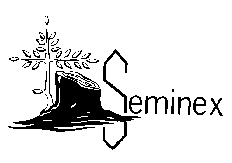 The Seminex logo, circa 1974, depicting new life springing from a dead trunk. Design by Seminex faculty member Robert Werberig. | |
Former name | Concordia Seminary in Exile |
|---|---|
| Active | 1974–1987 |
Religious affiliation | Association of Evangelical Lutheran Churches |
| President | John Tietjen |
Seminex is the widely used abbreviation for Concordia Seminary in Exile (later Christ Seminary-Seminex), which existed from 1974 to 1987 after a schism in the Lutheran Church–Missouri Synod (LCMS). The seminary in exile was formed due to the ongoing Fundamentalist–Modernist Controversy that was dividing Protestant churches in the United States. At issue were foundational disagreements on the authority of Scripture and the role of Christianity. During the 1960s, many clergy and members of the LCMS grew concerned about the direction of education at their flagship seminary, Concordia Seminary, in St. Louis, Missouri. Professors at Concordia Seminary had, in the 1950s and 1960s, begun to utilize the historical-critical method to analyze the Bible rather than the traditional historical-grammatical method that considered scripture to be the inerrant Word of God.
After attempts at compromise failed, the LCMS president, Jacob Preus, moved to suspend the seminary president John Tietjen, leading to a walkout of most faculty and students, and the formation of Seminex. Seminex existed as an institution until its last graduating class of 1983 and was formally dissolved and merged with Lutheran School of Theology at Chicago in 1987. Concordia Seminary quickly rebuilt and by the late 1970s had regained its place as one of the largest Lutheran seminaries in the United States.
The after effects of the controversy were vast. Before the split, the LCMS had both liberal and Evangelical wings. After Seminex, 200 liberal and moderate congregations split from the LCMS to form the Association of Evangelical Lutheran Churches (AELC), leaving the LCMS a more conservative body than it had been in 1969. The AELC itself would later merge with other liberal and moderate Lutheran churches to form the Evangelical Lutheran Church in America (ELCA).
